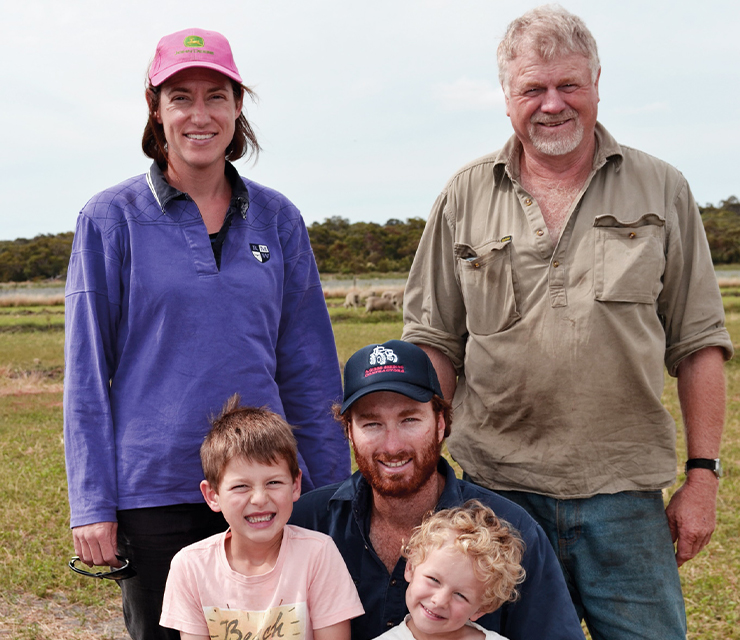 Josh (centre) and Madeline Hancock with Josh’s father, Wayne, and Josh and Madeline’s children Tait, 6, and Beau, 4. Image: Elke Hocking.
Josh (centre) and Madeline Hancock with Josh’s father, Wayne, and Josh and Madeline’s children Tait, 6, and Beau, 4. Image: Elke Hocking.
An eye to comply
SA lamb producer Josh Hancock went into a Profitable Grazing Systems (PGS) program expecting to pick up a ‘couple of extra things’ and came out the other side with tools to overcome stumbling blocks in his business.
Participating in the ‘Lamb Lean Meat Yield and Eating Quality – Realising the Potential’ pilot program cemented Josh’s existing understanding of supply chain compliance.
“Genetics was where I learned the most,” he said.
“Through the program, I worked out how to select the rams I purchased in 2019, based on balancing eating quality traits such as shear force and intramuscular fat with lean meat yield.
“You might not be rewarded on eating quality by the processors just yet, but it is literally around the corner and I want my animals to be genetically ready for when that happens.”
After talking with fellow producers in the program, Josh had the confidence to reduce ram joining rates from 2% to 1.5% (with plans to eventually transition to 1% plus one).
“I noticed at ram sales that producers who had more sheep than me were buying half the rams and, as a result, could afford to pay for better genetics,” Josh said.
“In 2019, I spent the same amount on ram purchases but ended up with fewer rams and the exact genetics I was after.”
Meeting demand
Josh has marketed lambs direct to JBS at Bordertown for the past four years. He supplies lambs to JBS’s Farm Assurance Scheme, targeting a 50kg live weight animal yielding a 23–24kg carcase.
He weans June and July-drop lambs on to pasture in October and sells them in November and December, while lighter lambs are retained and finished on irrigated lucerne and fodder crops and sold from February to April.
Participating in the Lamb Lean Meat Yield and Eating Quality pilot program, which involved workshops with JBS and following carcases through processing, reinforced his production goals to produce a consistent carcase which is high yielding and with a low, even fat cover.
“Every lamb producer should see exactly what a processor, and ultimately a consumer, desires – and that’s a high yielding lamb with good eating meat and not a lot of fat.
“Why put energy, and good feed, into producing fat?
“The future for Australian lamb looks extraordinary and if we ever return to high production, I want my animals to be the ones sought out by consumers and processors.”
Josh said participating in the PGS program, with its mix of group and individual learning, helped him fine-tune skills he’d developed over 10 years as he evolved his enterprise to be more focused on meat production.
“Producers need to join in these programs whenever they get the chance because you learn so much from the other producers, who are happy to share their wins and their losses,” he said.
Josh is a big fan of practical learning sessions – out in the paddock, on the processing floor or in the yards.
“Producers learn best when they can see, feel, touch and smell something. They learn by doing, rather than listening all the time. That’s where PGS works really well,” he said.
“To farm in the modern world, you have to keep learning, adapting and growing.
“Your confidence grows as you make changes and if these changes are successful, they’re the impetus for further change and growth.”
This year the Hancocks are focusing their attention on lifting their conception rates and lamb weaning percentage, as well as improving pastures and pasture management to provide a year-round, resilient feedbase.
Historically, the Hancocks achieved weaning rates of 96%, but, through improved management, they’re now seeing rates of 120%. Josh believes that, through targeted management of twin and single-bearing ewes, rates of 140% are achievable.
"We’ve started sowing early barley and annual ryegrass to get us through the winter feed gap, but we need to come up with some clever pasture mixes to match different soil types which are productive and persistent to help us with our goals,” Josh said.
|
Making supply chain linkages MLA’s Profitable Grazing Systems has developed a skills‑based training package to help producers improve and better understand supply chain compliance. Written by SA livestock consultant and producer Elke Hocking, ‘Lean Meat Yield and Eating Quality in Lambs – Realising the Potential’ has been delivered to producers in two pilot groups in SA and NSW. The package involves group and one-on-one coaching of producers, and involves partnering with a local processor. JBS in SA and Gundagai Meat Processors in NSW participated in the pilot program. The program is rolled out over 6–12 months, enabling participants to learn the skills to: - produce animals which meet customer specifications every time - understand lean meat yield, eating quality and objective carcase measurement - interpret and act on consumer requirements, processor grids and carcase feedback - develop practical solutions to increase compliance through better management of genetics, nutrition and animal health. The package will be available for wider delivery later in the year. |



